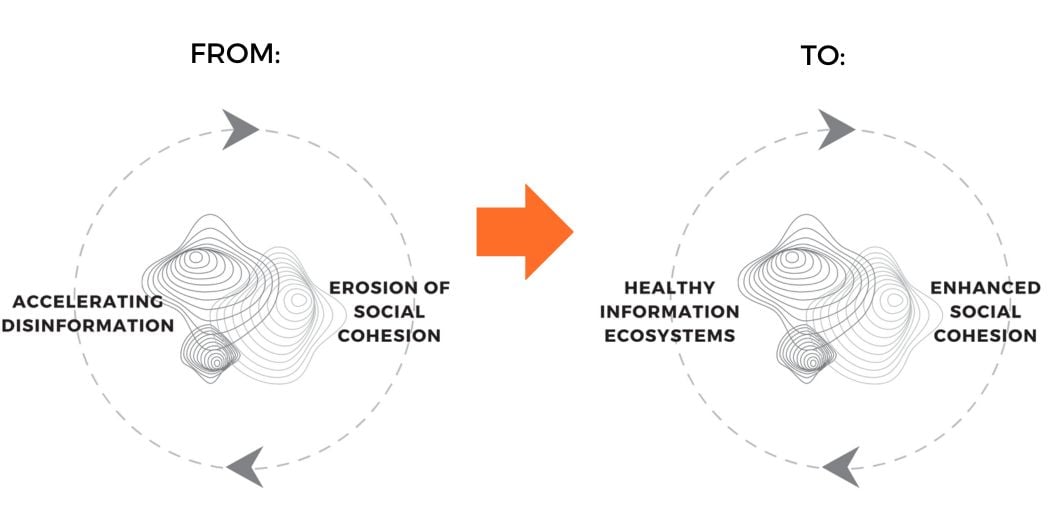Explore how the Shared Realities project works to strengthen social cohesion and resilience in an age of information disorder.
The challenge
Social cohesion is fundamental to the functioning of a healthy society. It refers to the relationships of trust and connectedness that enable a sense of a common good across different communities, underpin the social contract between citizens and government, and allow societies to deal with difference and conflict in non-violent and non-coercive ways. Today, social cohesion faces a set of harmful challenges and threats through the dynamics of digital misinformation.
While digital information technologies have the potential to benefit individuals and societies in many useful and important ways, their readiness to amplify and accelerate misinformation leads to vulnerabilities on a global scale.
This scale is possible because digital technologies have created conditions in which information:
- spreads further, faster across vast networks of interconnected channels and platforms
- can be micro-targeted to increasingly specific groups and profiles
- can be segmented so effectively and strategically that different realities can be presented to different people
Our approach
The Shared Realities Project, an initiative of the Reos Institute, aims to address the eroding relationship between truth and trust that is playing out across the globe. The project supports participants in developing new and enhanced understanding and awareness of the harmful feedback loop between social cohesion and mis- and disinformation (both on-line and off).

In doing so, it works to build resilience and catalyse tangible action to shift from harmful to healthier dynamics. The Shared Realities Project is a global and multi-local initiative for strengthening social cohesion and resilience in an age of information disorder.
It complements efforts being made by others through convening diverse stakeholders across geographies and disciplines in a process applying transformative scenarios, human-centred design, and action learning.
In this way, we cultivate an evolving ecosystem of connected changemakers who are committed to catalysing positive feedback loops between healthy information ecosystems and social cohesion.
Transformation
“In intense situations in crises, there is this need to pause, reflect, move and adjust directions. For me, at least, these conversations allowed me to see how I am operating within that system and how I can adjust direction if needed to help bring a more positive future about" - Participant feedback.
In 2023, the first iteration of Shared Realities was carried out in Tunisia, Lebanon, and Jordan, through a Learning Project. With the support of Porticus, and with the engagement of many collaborators, in each country we undertook the first steps of a systemic process to lay the groundwork for collaborative action towards healthy information ecosystems and enhanced social cohesion.
This project supports participants in developing new and enhanced understanding and awareness of the harmful feedback loop between social cohesion and mis- and disinformation (both online and off). In doing so, it works to build resilience and catalyse tangible action to shift from harmful to healthier dynamics.
Watch the project video here:
In each country (Jordan, Tunisia, Lebanon), participants shared their views about the feedback loop between social cohesion and mis- and disinformation in their own contexts, and potential areas for shifting from harmful to healthier dynamics. Taken together, these observations begin to paint a picture of shared experiences and challenges, including:
- Factors that may be exacerbating the erosion of social cohesion
- Conditions that may be contributing to the creation and spread of mis- and dis-information
- The ways in which mis- and disinformation may be influencing social cohesion in these contexts
- Potential entry points for positive change.
Watch this webinar, highlighting the various insights from the project:
Read the reports on 'Possible Futures for Social Cohesion in an age of Mis- and Disinformation' below to learn more about the various insights and findings.
The reports are also in Arabic and can be downloaded below: